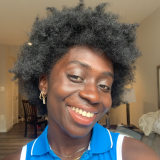Book Talk - Nina Sharma: The Way You Make Me Feel - Love in Black and Brown
When Nina Sharma meets Quincy while hitching a ride to a friend’s Fourth of July barbecue, she spots a favorite book, Maxine Hong Kingston’s The Woman Warrior, in the back seat of his cramped car, and senses a sadness from him that’s all too familiar to her. She is immediately intrigued—who is this man? In The Way You Make Me Feel, Sharma chronicles her and Quincy’s love story, and in doing so, examines how their Black and Asian relationship becomes the lens through which she moves through and understands the world.
In a series of sensual and sparkling essays, Sharma reckons with caste, race, colorism, and mental health, moving from her seemingly idyllic suburban childhood through her and Quincy’s early sweeping romance in the so-called postracial Obama years and onward to their marriage. Growing up, she hears her parents talk about the racism they experienced at the hands of white America—and as an adult, she confronts the complexities of American racism and the paradox of her family’s disappointment when she starts dating a Black man. While watching The Walking Dead, Sharma dives into the eerie parallels between the brutal death of Steven Yeun’s character and the murder of Vincent Chin. She examines the trailblazing Mira Nair film Mississippi Masala, revolutionary in its time for depicting a love story between an Indian woman and a Black man on screen, and considers why interracial relationships are so often assumed to include white people. And as she and Quincy decide whether to start a family, they imagine a universe in which Vice President Kamala Harris could possibly be their time-traveling daughter.
Written with a keen critical eye and seamlessly weaving in history, pop culture, and politics, The Way You Make Me Feel reaffirms the idea that allyship is an act of true love.
Co-sponsored by South Asian Studies Council, Afro-American Cultural Center, Council on African Studies, Asian American Cultural Center, American Studies at Yale
Speakers

Nina Sharma’s work has appeared in The New Yorker, Harper’s Bazaar, Electric Literature, Women’s Studies Quarterly, Longreads, and The Margins, among other publications. She received her MFA in writing from Columbia University’s School of the Arts and has been awarded residencies from Vermont Studio Center and St. Nell’s Humor Writing Residency.
Nina is formerly the Programs Director at the Asian American Writers’ Workshop and with Quincy Scott Jones she co-created Blackshop, a column that thinks about allyship between BIPOC people, featured on Anomaly. A two-time Asian Women Giving Circle grantee for her workshop, “No Name Mind: Stories of Mental Health from Asian America,” she currently teaches at Barnard College and Columbia University.
Nina is a proud co-founder of Not Your Biwi Improv. Her debut collection of personal essays is "The Way You Make Me Feel: Love in Black and Brown" (Penguin Press 2024).

Professor Bertholf’s research and teaching focus on Africana literature and literary criticism, critical theory, and Black intellectual history. His work has appeared or is forthcoming in Anthurium: A Caribbean Studies Journal, Journal of Popular Music Studies, south: a scholarly journal (formerly The Southern Literary Journal), Viewpoint Magazine, Diacritik, The Martyr’s Shuffle, The Philosophical Quarterly, the Nation Divided series at the University of Virginia Press, the Faulkner and Yoknapatawpha series at the University Press of Mississippi, and the Modern Language Association’s Options for Teaching series. He is also the author of Black Sophists: A Critique of Demagoguery (Ph.D. Diss., University of Pennsylvania, 2013) and paired transcriptions of John Coltrane’s 1957 Carnegie Hall performances of Thelonious Monk’s “Epistrophy.” Professor Bertholf’s current book project (tentatively titled “The Black Charismatic: Demagoguery and the Politics of Affect”) has been supported by a residential faculty fellowship at Wesleyan’s Center for the Humanities, where he currently serves on the advisory board, and by the Provost Fellowship (also at Wesleyan). He is the former founding co-director of Wesleyan’s Africana Studies Colloquium Series and the current faculty advisor and program director of Wesleyan’s Africana Research Collective.

Elishevlyne Eliason is a visual and literary artist interested in deconstructing and reimaging the world through the consumption and production of creative work. She engages with questions surrounding migration, placelessness and placemaking, surrealist writing and existences, and surveillance. She has won the 1st Place J. Edward Meeker Yale English Department Prize for her long-form essay on war photography and is a recipient of The Yale University Art Gallery’s Mary Hotchkiss Williams Travel Fellowship for the Visual Arts, which she used to photograph the migration crisis and West African life in New York and Colorado.
On campus, Elishevlyne is a Lead Writing Partner at the Yale Poorvu Center For Teaching and Learning, a member of the Yale Gospel Choir, and a student of American Studies and French. In the future, she hopes to do humanitarian foreign correspondence and documentary work, but for now, she spends her time running, reading books with her little sisters over Facetime, and, as of late, making lopsided pots for her ceramics class and resigning herself to the infuriating yet delightful process of failing.
- Humanity